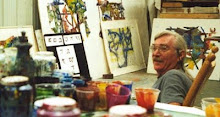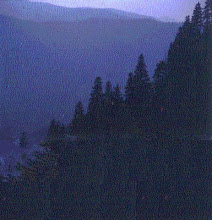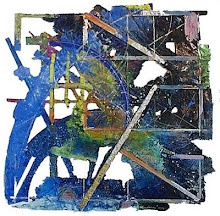Honor and I have come to show and tell you messages from our mountain community. Both Honor and I agree with the naturalist John Muir that “going to the mountains is coming home”
The paintings your see around you of Honor’s and the poems I’m going to tell you are all about that coming home. It’s not easy, coming home:
*
WE ARE ALL
We are all vagabonds
on this earth, wanderers
with hungry hearts
looking for a home
we never had.
At night we gather
to distant fires
of scavenged wood and brush
stir the ashes there
and seek answers in the stars.
In ceremony
we mark our faces
with our dream of want -
flames and crosses and circles.
And we carry this into all our days
even into the desert of our lives
dreaming into each new country
our home again.
- Laurence, 9/09
Paintings and poems share something important -
a concentrated form of paying attention.
Paying attention to what is!
And what is is both moving and still
Paintings are still and yet move in our minds, our thoughts and feelings.
Poems are always moving in our minds, and thoughts and feelings
and yet form pooling echoes of the still and eternal present.
Paintings and poems - two sides of the same coin
As Honor puts it:
“we come together
in the middle
your shade of green and mine
not sure which way is up
at times your green is on top
sometimes mine is the sky
sometimes the red is river
others a hilltop
ablaze in the late sun
still others, a river of blood
that takes a bit of you and a bit
of me with it to the ocean.
sometimes, though, it is
a beautiful, shining light, that
draws us both near.”
Poems and paintings are grown not made
No hammer or nail will oblige.
What’s needed is water and silence
seeing and listening
moving to a time as slow as roots.
WHAT’S NEEDED?
What’s needed
is water
and dark
moving to a time
as slow as roots
in a well
where slivered fish
swim
in a dream
of knowing
not caught
but foreseen.
SEEING, CREATING
-
to be read to my students in drawing class
Seeing, creating,
it is an endless quest
for it is going nowhere in space or time
but only deeper into the presence.
There is grace in this.
It is the grace of knowing
that our consciousness and the light
are always arriving in the world
together.
Hello!
SPIRIT SALSA
-
for Lynn
Come and dance
you and me
come and go
around and back
and come again
all the patterns flying
there is no you
there is no I
and we two are
but a fold in time.
Come!
and dance between
all the patterns making
and unmaking
you and me now
step again
with me now
into this always
changing
moving
desiring
and then just there
and then
where it calls us back
into the circle
where letting go
is holding on
to where
the meaning always is
moving on
to a desire
that brings to life
and the dance between
you and me
always making
come and go.
My love!
Come and dance with me!
We are sorely in need of these messages that art can show and tell us.
The glaciers are melting and the seas are rising... and there’s not much time.
LISTEN!
Listen!
Will the world be still
after we depart?
Will there be cold? Will there be sweetness?
Will the birds still talk about
what we never learned to hear?
Or will it all be forgotten, or forgiven,
or will it just be still?
Listen!
Our children are coming and we are going.
It’s late, but listen!
If we fail to listen
and then to tell them,
the rivers and the mountains
will stop breathing in
their fullness. They’ll stop whispering
their care and advice, and there will be nothing
for our children to hear
but their nightmares.
As social anthropologist Mircea Eliade once noted “Properly speaking, there is no longer any world, there are only fragments of a shattered universe.” (
The Sacred and the Profane, p.23-24)
We artists say NO! we won’t live like this. And so we seek to remember the wholeness of this world, to recall for us all what Thoreau and John Muir said “This IS the first morning of Creation.”
Any one who has seen the Hawaii volcano Kilauea spilling molten lava into the sea (or seen a film of it) can have no doubt that creation is today and this morning, just as it is up behind my house where Green Gap Branch issues out from under a rock just below the Bartram Trail.
Jonathan Bate in his book
The Song of the Earth (2000) exploring the role of poetry in our changing concepts of nature writes “As the solidity of things is replaced by the evanescence of commodities, so the poets [and artists] must stand in for the ancient Roman “lares”, those everyday gods who guarded hearth and home. On another level, as the realm of nature - the wilderness, the forest, that which is untouched by the human, the Being that is not set upon - has diminished almost to vanishing - point with the march of modernity, of technology and consumerism, so a refuge for nature, for the letting-be of Being, must be found in poetry [and art]” (The Song of the Earth (2000) ( p.264”
But it’s hard to stand on a mountain side in Rabun County and believe that anything is coming apart, or is made of fragments.
FINGER WEAVINGS
- a poem to be read by two voices
(male voice):
(female voice):
in afternoon light
I walked in late winter woods
all stripped to bone
I stopped to sit and smoke
and sort the jigsawed pieces
of a splintered life
the mountain’s flank
swathed in an amber caul of light
in the quiet I thought I felt
something being offered
stitching at a wound of light
and dark,
pulling at the threads
of the living and the dead.
I thought to say
thank you
to something being given
knitting
through leaf litter,
bark and sky,
a land of gatherings
in this quiet.
In this quiet it’s dangerous
giving voice to wish
as a sailing hawk far off
calls
then catches and lifts on the wind
a word said
can’t ever be taken back
inside
jointing, feathering,
fitting flesh to air,
air to flesh
beware
what you wish, for
it could have consequences
the horizon is already
mountain saying sky,
the sky already
saying mountain
instead I cast
a pinch of tobacco
everything else
is already offering
this to that
and that to this
(now both voices together):
in the simple speech of respect
we are sewn together.
we are sewn together.
These mountains are daily wrapped in mystery and fact:
the light, the dark, the round of seasons,
the time of deep past, deep present, deep future -
these all speak to us,
the mists alternately hiding and revealing
the steep slopes, the shaded coves, the bright rivers,
our lives and our work.
BREACHING
I wake
from submarine dreams
and breach the morning
in the blue lake light
of dawn.
Afloat on my back
I watch the sun come up
and turn the whole room
to peach
the sweetness drawing
from one world to the next.
DAWN
Dawn,
with lighted fingers
stitches a delicate thread
an amber line of ridge against the night
- then begins
to hem
the greening march of trees
down along the still dark creek
- and begins
to mend
out of what might have been
this day together
- once again
such prescient
marvelous
needlework!
- surely sewn
we together
out of wonder
this world.
ON A DAY, STILL
On a day still
as sleeping cats, among
a stand of pines, one cracks
near its base and falls
against another.
No fault
of weather or storm,
just a failing within -
a fissure running six feet up
and all the tissue there
collapsing like a knee blown out.
In a moment
drawn out so long
it too is stilled,
the broken one leans
against another
as if it stumbled
in some crowd going to a game
and the others
not taking notice, but
kindly accept to offer
a shoulder to a stranger.
One against another,
no one speaking -
sometimes it’s all we’ve got,
each of the other.
Six months later,
coming down the trail
this moment is still here
and now, lifted out of a spring
as a handful of water
is lifted out of time.
OH, SNOW!
Oh, snow! clean
like forgetting, fresh
like remembering.
WINTER SPRINGS
Winter
springs, silent
seepages,
from cracks
in great mountains,
weepings
from some far
away ocean
of time.
SPLITTING
a chunk of wood
on the chopping block
three wedges sledge gloves
all that’s wanted
a steep swing then
steel on steel
a bell rings
then thwack
and the timber opens
like a book
within grey covers
the scent of summer last
yellow
and a sweet secret
revealed to me
the tree long gone
the breath in it
still here
all that’s needed
OUR BREATHS EACH TIME
Our breaths each time
reach out and come back.
They must so love the world
they always go back
for more.
Or perhaps I’ve gotten this
all wrong. This breath’s
not ours at all, but the world’s.
The world’s searching deep
into our opened chest
and then pulling back
for more.
This tide,
in its gravity of care
is drawing us on forever.
These days the glaciers are melting and the seas are rising, and the animals and plants are going. But along the steep escarpment of the Blue Ridge Mountains springs squeeze out of rock, flush into clattering branches, knot together strand by strand from the strength of these mountains. Nevertheless, these mountains are ravaged, scarred and wounded, not by that, but by us. First it was the genocide and ethnic cleansing of the Ani-Yunwiya,"the principle people" the Cherokee. Then it was the lumbering. Then it was lumbering's aftermath - the floods that flushed away essential topsoil. Now it's real estate.
WILL YOU BE THE ONE?
for Honor and Robinette
Will you be the one
to leave a sign in the ground
for those who come after to find
that we too lived
and loved, cried and died,
fighting with ourselves and each other
to the end of us
and that one of the least of us
left this coin.
WHAT THEY WANTED
The teacher asked them
to draw what they wanted.
The commissioner's son drew streets,
paved and straight and bright.
The developer's son drew signs
covering the hillsides with crisp dollar bills.
The lakehouse owner's son drew mansions
in a shimmering necklace around the lake.
The environmentalist's son drew a river
bobbing with kayaks and laughter.
The carpenter's son drew houses,
board upon board, high enough to reach the sun.
The fatherless daughter drew just one
great mountain, like two hands
joined in prayer,
opening in praise.
CALLINGS
Hawk calls:
where are you?
don’t forget me.
don’t forget me.
Crow calls:
call, call, call.
aha!
call all.
aha!
a slight and unseen bird calls:
Squeak!
speak, speak, speak.
don’t be silent!
We all need to go home, and there to listen and to speak:
DRIVING HOME
Driving home, eastward
out of the seething traffic,
out to the bitter end of it,
out past the houses
where indigent souls feed on bread
coming up through tar and stones,
Out past the farms and fields
where cedar on wasted ground
accedes to groves of poplar.
out where the road rises
to loaves of hills leavening in the sun
and the eye lifts to the blue of mountains.
Up slope then into a forest of oak and hickory,
the daylight broken and splintered
and dancing with shadows.
Up to ridge top, ragged and scoured,
slipping over its divide unseen and
unregretted, to rejoin ourselves
down the farther shadowed folded thigh of this
into the sweetening breath of hemlock,
into the tumbling chatter of Becky Branch,
turn after turn unwinding,
shedding my skin of what we’ve known
down between the saltiness of rock, the sourness of root,
into a darkening cleft
secret as being.
Just going to earth, just going home.
Eastward then, out into the valley,
brightening, breached and unfolding,
- just a little farther
beyond what we’ve known and owned,
just beyond the border,
home to what we’ll become:
nothing more than root, salt, earth,
a breath given up to wind,
nothing less than always yearning eastward.
WE ARE ALWAYS DREAMING
We are always dreaming,
the good life, the bad life,
the life not lived.
In our ceremonies
we mark our bodies
with the signs of our dreams:
flames and crosses and circles.
Wearing our dream marks
we carry our whole lives
into the country of our days.
We must do this - keep it up,
this dreaming into our waking country,
keep it going, keep it safe,
even into the desert of our selves.
THIS WAY, THIS STONE
This way I’m shaping
this stone small
as a bird’s egg makes
in the palm of my hand
a nest for what an eye sees
and can imagine
the smooth and rough of it
this way against that
of what might be
a shape gathered up
just here drawing out
and dying just there
the feel between the grain
of all such things as stones
and hands and dreams.
The rough self
the smooth self
the still self
the unknown self
drops like an egg
into a well of wonder.
LESSON #1: HOW TO LISTEN TO A BIRD SING
Take off all
your clothed and
clammy thoughts.
Sit awhile.
Make nothing up
between the intervals of silence,
but listen to them.
Between each breath
is a song you’ve forgotten,
is always calling us
to gather to this wild
and shocking world.
This music happens to us
before we can ever think about it
this song happens in us
before we can ever say it’s impossible
to listen before we speak
of nothing or everything.
LAST THOUGHTS ON TESTIMONY
“Rühman, das ists!” - Rilke
After the catechisms,
after all the acolyte years,
after hearing the preacher scream on the radio:
“...from the Thank-God-Almighty-
Atlanta Highway-Church of Redemption,”
I think God wants only singing.
She wants only that there be singing!
It doesn’t matter who does it.
If I don’t, some one else will.
For God only wants
there to be singing.
-His only true gift to me.
*
For information on Honor Woodard's paintings shown here
go to: silvermoonfrog.blogspot.com/





















